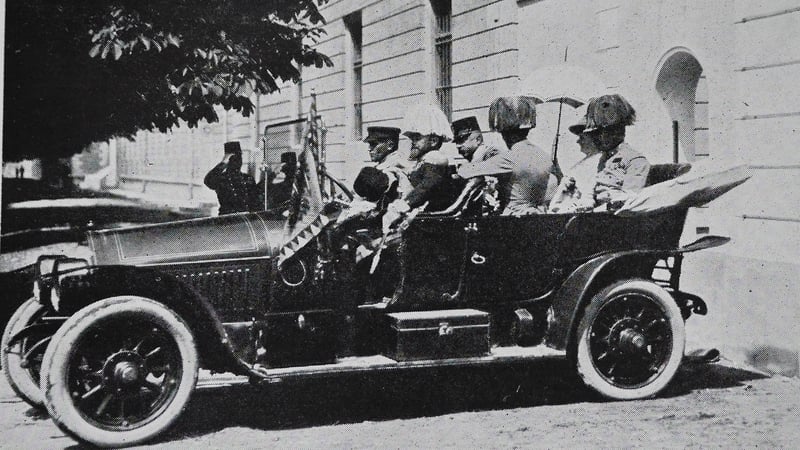

German unification and rapid economic growth were foundational to his foreign policy. Bismarck's diplomacy of Realpolitik and powerful rule at home gained him the nickname the Iron Chancellor. However, the annexation of Alsace–Lorraine gave new fuel to French revanchism and Germanophobia. To historian Eric Hobsbawm, Bismarck "remained undisputed world champion at the game of multilateral diplomatic chess for almost twenty years after 1871, devoted himself exclusively, and successfully, to maintaining peace between the powers". With Prussian dominance accomplished by 1871, Bismarck skilfully used balance of power diplomacy to maintain Germany's position in a peaceful Europe. Receiving the support of the independent South German states in the Confederation's defeat of France, he formed the German Empire – which also excluded Austria – and united Germany. Following the victory against Austria, he abolished the supranational German Confederation and instead formed the North German Confederation as the first German national state, aligning the smaller North German states behind Prussia, while excluding Austria. Bismarck provoked three short, decisive wars against Denmark, Austria, and France. The King granted Bismarck the titles of Count of Bismarck-Schönhausen in 1865 and Prince of Bismarck in 1871. He cooperated with King Wilhelm I of Prussia to unify the various German states, a partnership that would last for the rest of Wilhelm's life. He had served as the chancellor of the North German Confederation from 1867 to 1871, alongside his responsibilities in the Kingdom of Prussia.
/ScreenShot2017-12-15at3.07.19PM-5a342bc8eb4d5200379049ec.png)
He masterminded the unification of Germany in 1871 and served as the first Chancellor of the German Empire until 1890, in which capacity he dominated European affairs. Before his rise to the executive, he was the Prussian ambassador to Russia and France and served in both houses of the Prussian Parliament. From his origins in the upper class of Junker landowners, Bismarck rose rapidly in Prussian politics, and from 1862 to 1890 he was the minister president and foreign minister of Prussia. Princip was buried at the Terezín municipal cemetery and his remains were moved to Sarajevo in 1920.Otto, Prince of Bismarck, Count of Bismarck-Schönhausen, Duke of Lauenburg ( German: Otto Fürst von Bismarck, Graf von Bismarck-Schönhausen, Herzog zu Lauenburg, pronounced ( listen) 1 April 1815 – 30 July 1898), born Otto Eduard Leopold von Bismarck, was a conservative German statesman and diplomat. He and two of his accomplices were transported to the prison in the Terezín Small Fortress where all three later died of tuberculosis. He killed Franz Ferdinand seven days before his 20th birthday.Īs a result, Princip was sent to prison for 20 years. Princip was not sentenced to death for the assassination because the death penalty could not be applied to people who were younger than 20 years under Habsburg law. In Bosnia and Herzegovina, Princip’s Slavic origin is challenged, however, he added.įranz Ferdinand’s wife Sophie, Duchess of Hohenberg, was a Czech aristocrat, born as countess Zofie Chotkova. He said Serbs living in the Czech Republic see Princip as a hero. More than two million of them were killed in World War I,” said Václav Dvořák from the Friends of Serbs in Kosovo group. On the other hand, his deed brought enormous suffering on the Serbs. “Some consider him a hero of the national resistance movement. Princip is a controversial figure, even for Serbs. Masaryk,” said one of the initiators of the requiem, Social Democrat (ČSSD) MP Jaroslav Foldyna, whose mother is Serb. The activists from southeast Balkans were later defended by the first (Czechoslovak) president T. “However, it was also one of the first steps that led to the foundation of independent Czechoslovakia. The assassination provoked Austro-Hungary’s invasion of Serbia, which led to World War I. Terezin, North Bohemia, April 26 (ČTK) - An Eastern Orthodox requiem mass for Bosnian Serb Gavrilo Princip, a young political activist who assassinated Austrian Archduke Franz Ferdinand and his wife Sophie in 1914, was today celebrated in the Terezín Small Fortress where Princip died on April 28, 1918. Serb anarchist Gavrilo Princip shot Franz Ferdinand in 1914 and later died in Terezín


 0 kommentar(er)
0 kommentar(er)
